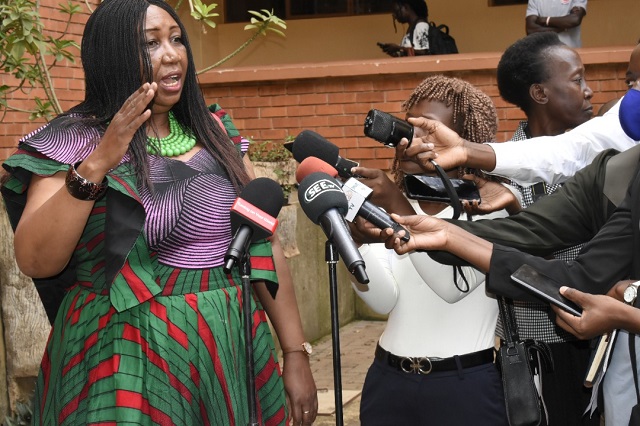
Kampala, Uganda | THE INDEPENDENT | The Uganda Human Rights Commission-UHRC is pushing for the amendment of several provisions in the laws of Uganda that seek to deny citizens access to information.
Mariam Wangadya, the UHRC chairperson says despite the constitutional provisions on access to information, a section of public officers are still withholding information hiding behind the Official Secrets Act and other provisions in related laws.
Wangadya made the remarks on Wednesday while speaking at a public dialogue organized to mark the International Day for Universal Access to Information. She said that although officers take an oath of secrecy, many are fond of hiding publically available information under the guise of conforming to their oath.
The right of access to information is enshrined in article 41 of the Constitution which provides that; Every citizen has a right of access to information in the possession of the state or any other organ of the state except where the release of the information is likely to interfere with the security of the state or the right to the privacy of any other person.
Wangadya notes the amendments in the existing laws should clearly stipulate such information which cannot be accessed by the public but also states the provision of declassification when what is seen as a threat to the security of the state has come to pass.
The UHRC chairperson also brought up other critical issues, such as the deadline for a public official to provide information. The law sets a limit of 21 working days, but according to Wangadya, timing is crucial for some information because it might be shared when it is no longer useful.
“These officials also conceal information using the time limit. This needs to be checked and addressed as well. When a person walks to your office seeking information, there must be a reason why he or she needs that information. If the officer deliberately delays giving it out, the information can be outdated,” Wangadya said.
Uganda is praised to be among the first African countries to enact a right-to-information law, the Access to Information Act, and its follow-up, the Access to Information Regulations. All these were put in place with the sole aim of encouraging transparency and accountability in all state institutions by making timely, easily accessible, and accurate information available to the general public.
However, despite the laws being in place, there is still a significant information gap between the general public and public officials.
A 2021 survey by Twaweza’s Sauti Za Wanainchi shows that most citizens are unaware of the provisions of the relevant legislation, and the burdensome processes for requesting information hurt the volume of requests for information from the general public. For instance, in the survey when one asks Ugandans where one can go and get certain information on some services provided by local government, over 70 percent don’t know.
Marie Nanyanzi, the senior programs officer of Sauti za Wananchi at Twaweza, said as public officers are put on task to provide information, there is a need to sensitize the public on how and where they can seek information.
“Government will gain from individuals knowing where and how to obtain information. Due to this knowledge vacuum, many programs, including the recently introduced Parish Development Model, fail. As the proportion of people unaware of such initiatives rises, they won’t produce any positive outcomes,” Nanyanzi said.
Robert Kotchani, the country representative for the United Nations High Commission for Human Rights, also said that the right to information held by the government is crucial for transparency and accountable government in a democratic society by encouraging and facilitating greater public participation and scrutiny and fostering better decision-making.
In the age of the internet, new technologies are providing access to information with increased importance and greater scrutiny, according to Kotchani, who maintained that access to information is a right but not a privilege. He believes that to create effective governance systems, it is important to highlight the importance of access to information legislation and its execution.
The UN official couldn’t resist commenting on the computer misuse bill which was recently passed by parliament noting that there are concerns that if it is accented to by the President in its current state, it will stifle the acquisition of information guaranteed under the constitution.
Kotchani noted that the commission is preparing a document to share their opinion on the matter with President Yoweri Kaguta Museveni.
*****
URN
 The Independent Uganda: You get the Truth we Pay the Price
The Independent Uganda: You get the Truth we Pay the Price


